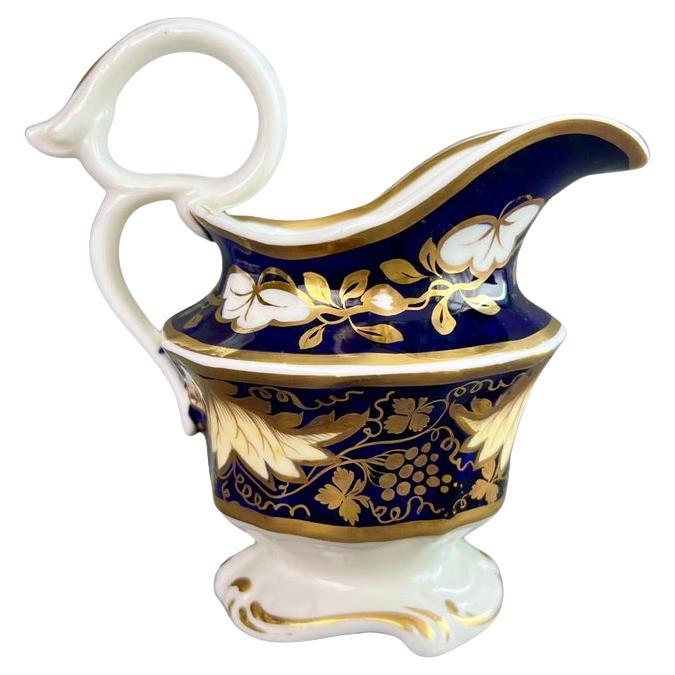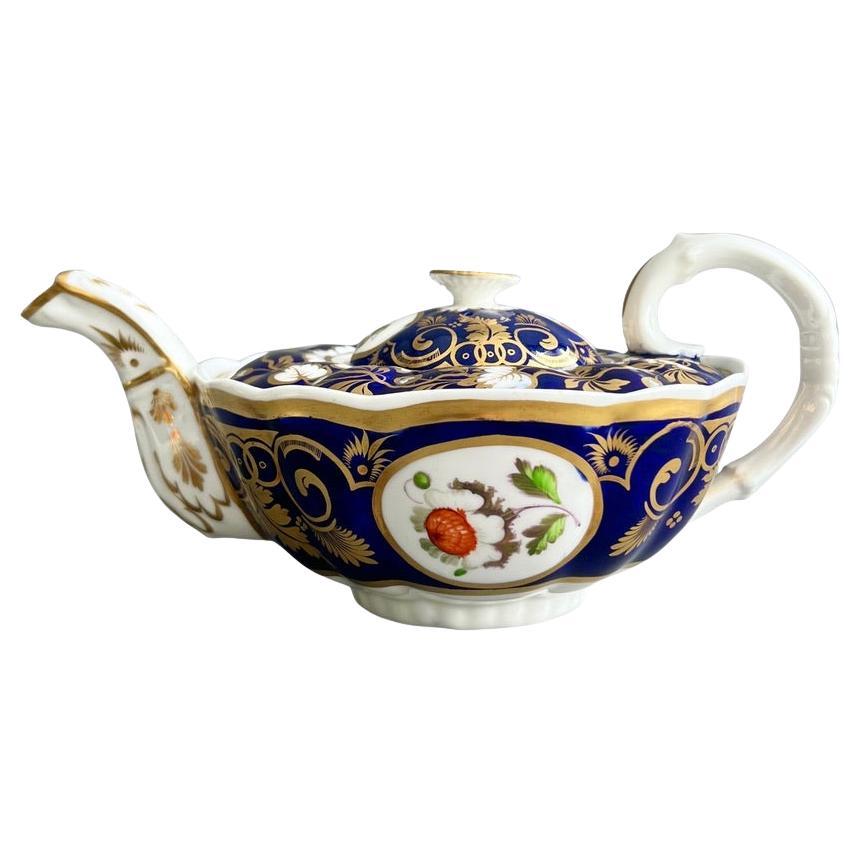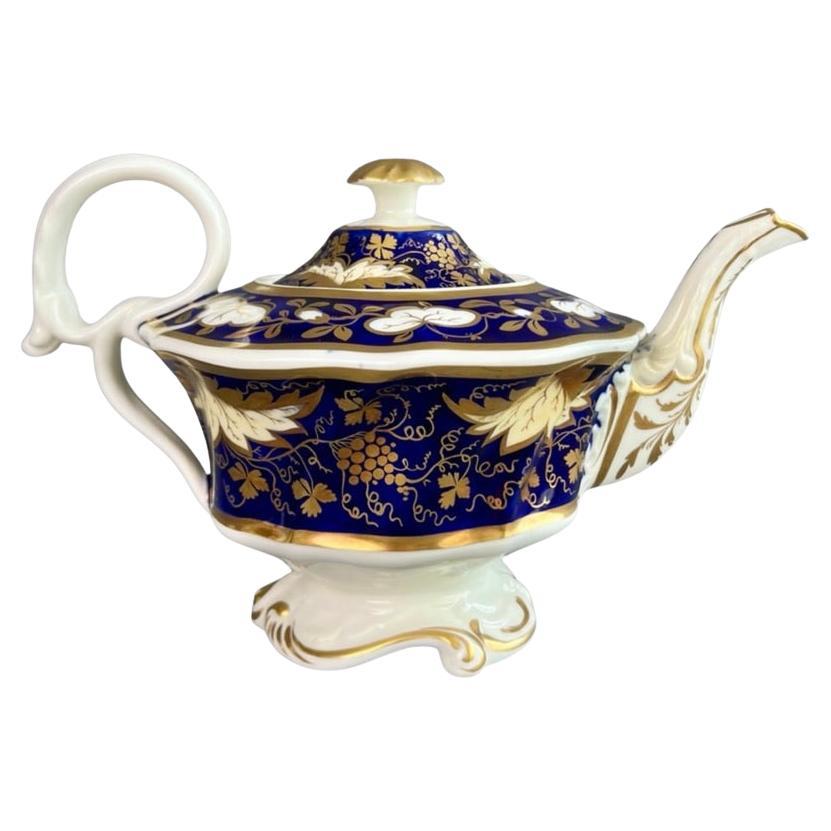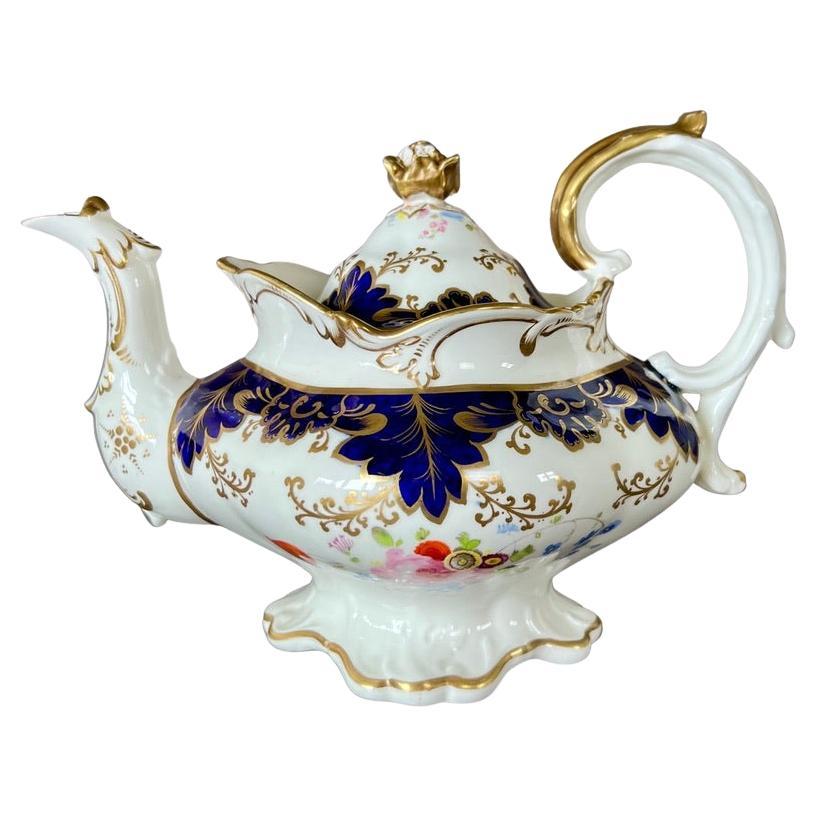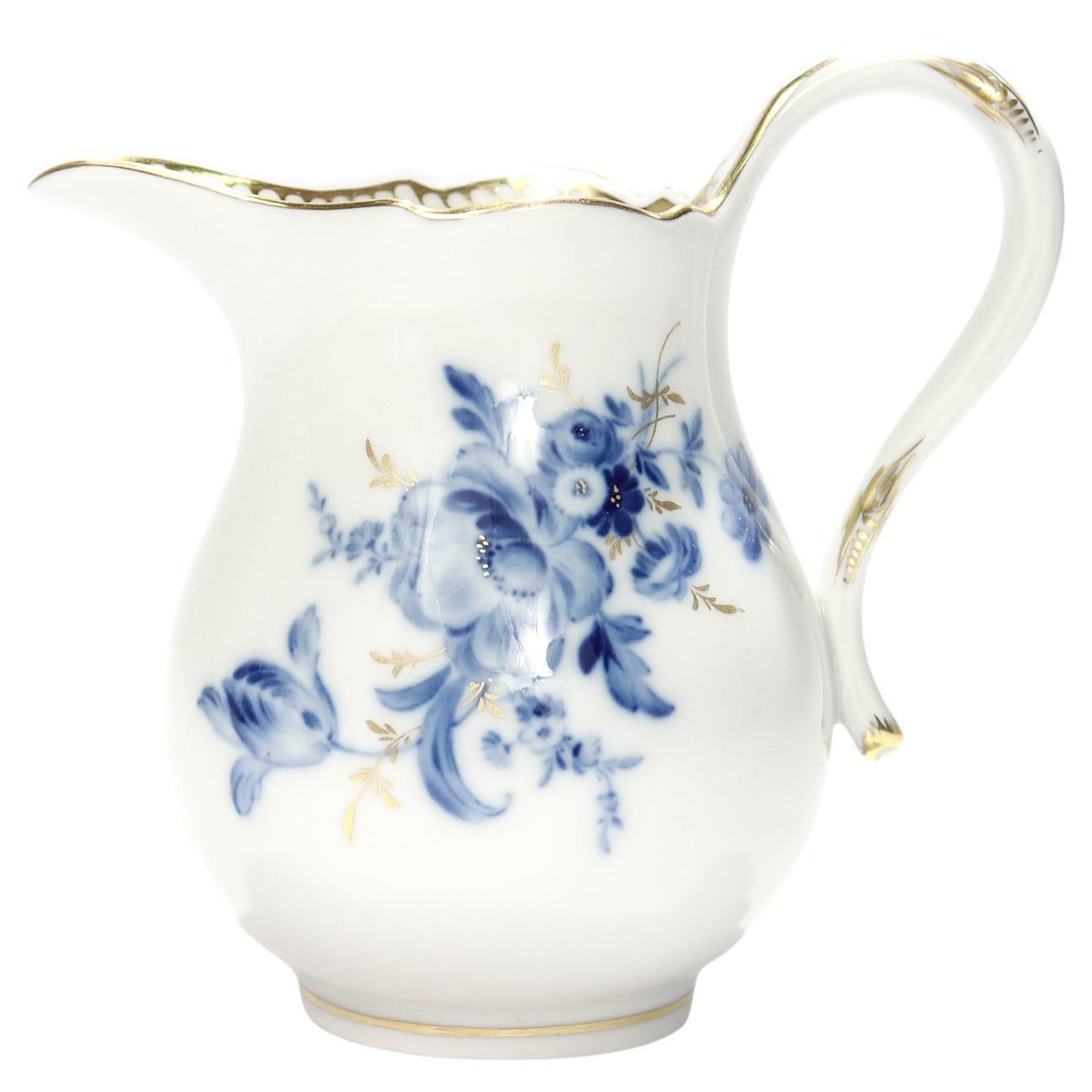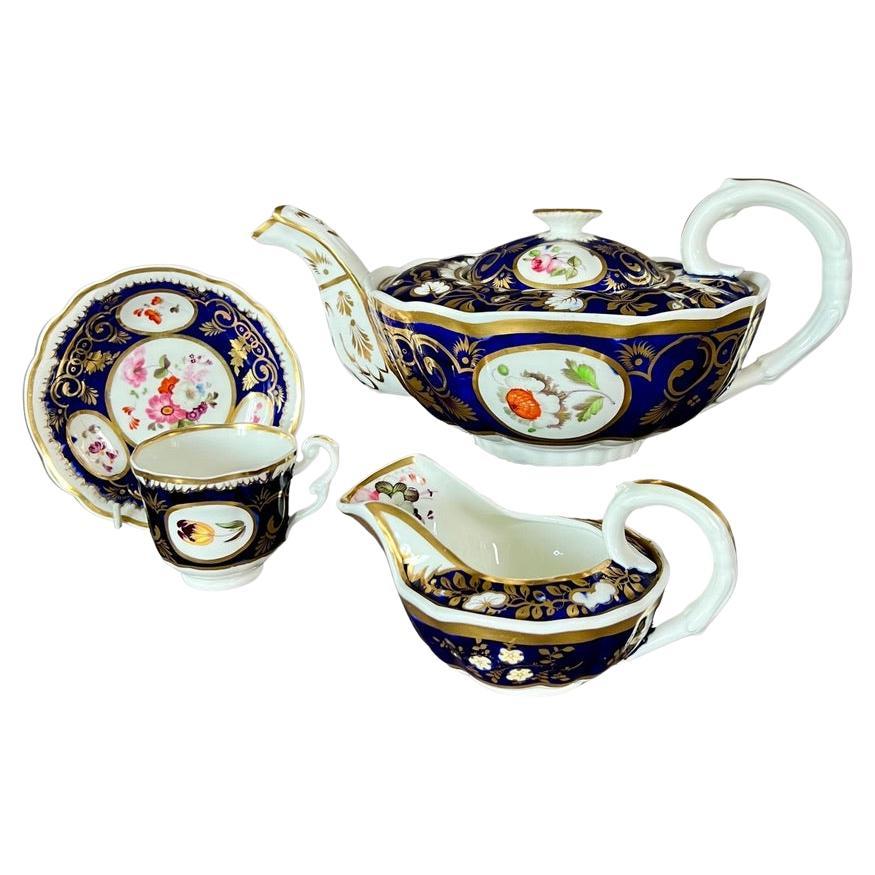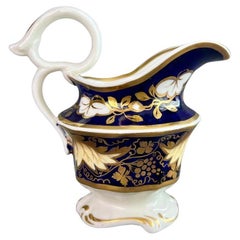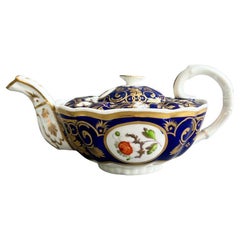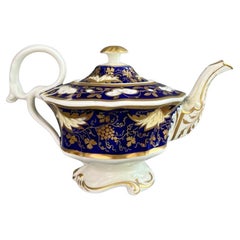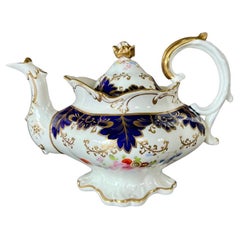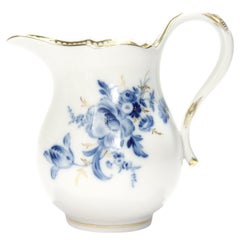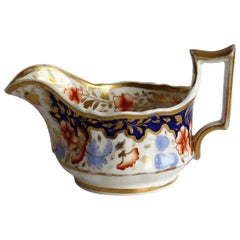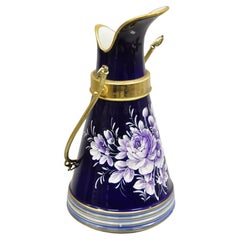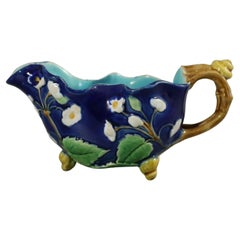Items Similar to Samuel Alcock Milk Jug Creamer, cobalt Blue, Gilt Vines and Flowers, ca 1825
Want more images or videos?
Request additional images or videos from the seller
1 of 14
Samuel Alcock Milk Jug Creamer, cobalt Blue, Gilt Vines and Flowers, ca 1825
$425
£322.13
€372.89
CA$599.99
A$668.14
CHF 348.85
MX$8,095.71
NOK 4,399.36
SEK 4,151.14
DKK 2,783.59
About the Item
A beautiful milk jug in the very rare "half orange" shape with "melted snow" border; with deep cobalt blue ground, rich gilt trailing vines and a stunning hand painted flower spray in the inside of the mouth.
We also have a beautiful teapot and coffee cup in a nearly identical pattern, please see separate listings.
Patterns 2199
Year: ca 1825
Size: 15.5cm (6.1") between handle and mouth; 8cm (3.1") tall.
Condition: perfect.
The Samuel Alcock factory was operative in Staffordshire between 1822 and 1856, after which it was bought by Sir James Duke and Nephews. The factory started as a partnership between the young Samuel Alcock and the older Ralph Stevenson, who provided the factory and capital. Alcock quickly took the factory to great heights, building one of the biggest factories of its time. Alcock jumped on the new Rococo Revival fashion and served a huge new middle class market. The reason we now don't hear much about Samuel Alcock porcelain is that much of it has been mis-identified over the years and attributed to Coalport, Ridgway, Rockingham or others; Alcock did not mark any of his porcelain save a few rare pieces, and the numbering system is difficult to understand. However, the wares are still wide spread and many are of great quality.
This item forms part of the Murray Pollinger Collection of Samuel Alcock Porcelain. Most of the collection is not publicly available yet, but if you would like to get access to the first 100 lots, please sign up for our mailing list at the bottom of this page, and we will send you the full catalogue with more information, from which you can purchase more items.
Murray Pollinger was a passionate collector of Samuel Alcock porcelain. He was known as a true gentleman, impeccably dressed, always kind and modest - even some of his porcelain collecting friends had no idea about the size and importance of his collection. From the mid 1980s until shortly before his death in 2022 he collected many thousands of pieces and painstakingly catalogued them. He also went on trips to Staffordshire to discover the history of Samuel Alcock from whatever little documentation has been preserved. Through his painstaking work, Pollinger was able to make sense of the pattern numbering system that was used, and this was a huge step forward in identifying and understanding the porcelain. A website with the results of his research will be made availabe over the course of 2023. While he sold off about half of his collection in 2016, the remaining half is now made available to a new generation of collectors.
Antique British porcelain is never perfect. Kilns were fired on coal in the 1800s, and this meant that china from that period can have some firing specks from flying particles. British makers were also known for their experimentation, and sometimes this resulted in technically imperfect results. Due to the shrinkage in the kiln, items can have small firing lines or develop crazing over time, which should not be seen as damage but as an imperfection of the maker's recipes, probably unknown at the time of making. Items have often been used for many years and can have normal signs of wear, and gilt can have signs of slight disintegration even if never handled. I will reflect any damage, repairs, obvious stress marks, crazing or heavy wear in the item description but some minor scratches, nicks, stains and gilt disintegration can be normal for vintage items and need to be taken into account.
There is widespread confusion on the internet about the difference between chips and nicks, or hairlines and cracks. I will reflect any damage as truthfully as I can, i.e. a nick is a tiny bit of damage smaller than 1mm and a chip is something you can easily see with the eye; a glazing line is a break in the glazing only; hairline is extremely tight and/or superficial and not picked up by the finger; and a crack is obvious both to the eye and the finger. Etcetera - I try to be as accurate as I can and please feel free to ask questions or request more detailed pictures!
- Creator:Samuel Alcock & Co. (Maker)
- Dimensions:Height: 1 in (2.54 cm)Diameter: 1 in (2.54 cm)
- Style:Rococo Revival (Of the Period)
- Materials and Techniques:
- Place of Origin:
- Period:
- Date of Manufacture:circa 1825
- Condition:Wear consistent with age and use. in perfect antique condition.
- Seller Location:London, GB
- Reference Number:Seller: MP-ALC61c1stDibs: LU4805146413492
About the Seller
5.0
Vetted Professional Seller
Every seller passes strict standards for authenticity and reliability
Established in 2016
1stDibs seller since 2019
226 sales on 1stDibs
Typical response time: 2 hours
- ShippingRetrieving quote...Shipping from: London, United Kingdom
- Return Policy
Authenticity Guarantee
In the unlikely event there’s an issue with an item’s authenticity, contact us within 1 year for a full refund. DetailsMoney-Back Guarantee
If your item is not as described, is damaged in transit, or does not arrive, contact us within 7 days for a full refund. Details24-Hour Cancellation
You have a 24-hour grace period in which to reconsider your purchase, with no questions asked.Vetted Professional Sellers
Our world-class sellers must adhere to strict standards for service and quality, maintaining the integrity of our listings.Price-Match Guarantee
If you find that a seller listed the same item for a lower price elsewhere, we’ll match it.Trusted Global Delivery
Our best-in-class carrier network provides specialized shipping options worldwide, including custom delivery.More From This Seller
View AllSamuel Alcock Milk Jug Creamer, Cobalt Blue, Gilt Vines, "Writhen" Shape, ca1826
By Samuel Alcock & Co.
Located in London, GB
A milk jug in the “writhen” shape, cobalt blue ground with white and pale yellow trailing acanthus leaves and vines.
We have a teapot with cover in the same pattern available, pleas...
Category
Antique 1820s English Rococo Revival Porcelain
Materials
Porcelain
Samuel Alcock Teapot, Cobalt Blue, Gilt Vines and Flowers, ca 1825
By Samuel Alcock & Co.
Located in London, GB
A beautiful teapot with cover in the "half orange" shape with “melted snow” border, decorated with a deep cobalt blue ground, rich gilt vines and hand painted flower reserves.
We al...
Category
Antique 1820s English Rococo Revival Porcelain
Materials
Porcelain
Samuel Alcock Teapot, Cobalt Blue with Gilt Vines, "Writhen" Shape, ca 1826
By Samuel Alcock & Co.
Located in London, GB
A teapot with cover in the “writhen” shape, cobalt blue ground with white and pale yellow trailing acanthus leaves and vines.
We have a milk jug in the same pattern available, pleas...
Category
Antique 1820s English Rococo Revival Porcelain
Materials
Porcelain
Samuel Alcock Porcelain Teapot, Blue, Gilt and Flowers, Rococo Revival ca 1837
By Samuel Alcock & Co.
Located in London, GB
A teapot with cover in the “rustic bean” shape, cobalt blue ground with gilt acanthus motif and finely painted flower posies on the belly of the teapot
Pattern 5782
Year: ca 1837
Si...
Category
Antique 1830s English Rococo Revival Tea Sets
Materials
Porcelain
Samuel Alcock Solitaire Tea Set, Cobalt Blue, Gilt Vines and Flowers, ca 1825
By Samuel Alcock & Co.
Located in London, GB
A solitaire tea set consisting of a teapot with cover, a milk jug and a small cup and saucer, in “melted snow” shape, the cup with double drop handle, with deep cobalt blue ground, r...
Category
Antique 1820s English Regency Tea Sets
Materials
Porcelain
$1,190 / set
Free Shipping
Samuel Alcock Cup and Saucer, Cobalt Blue, Gilt Vines and Flowers, ca 1825
By Samuel Alcock & Co.
Located in London, GB
A beautiful coffee cup and saucer in the rare “melted snow” shape with a double drop handle, decorated with a deep cobalt blue ground, rich gilt vines and finely hand painted flower ...
Category
Antique 1820s English Rococo Revival Porcelain
Materials
Porcelain
You May Also Like
Antique Meissen Porcelain Gilt Scalloped Creamer/Milk Jug with Floral Decoration
By Meissen Porcelain
Located in Philadelphia, PA
A fine antique porcelain milk jug or creamer.
By Meissen.
Decorated with blue underglaze flowers with gilt stems and twigs on a white grou...
Category
Early 20th Century German Art Nouveau Porcelain
Materials
Porcelain
Ridgway Porcelain Milk Jug or Creamer Pattern 2/1005, Regency Period, circa 1825
By J & W Ridgway
Located in Lincoln, Lincolnshire
This is a very decorative, porcelain milk jug or creamer in the early Grecian shape, made by John and William Ridgway, of Shelton, Hanley, Staffordshire Potteries, England, dating to...
Category
Antique Early 19th Century English Regency Ceramics
Materials
Porcelain
Vintage Keramos Italian Capodimonte Cobalt Blue Porcelain Pitcher w/ Handle
By Capodimonte
Located in Philadelphia, PA
Vintage Keramos Italian Capodimonte Cobalt Blue Porcelain Pitcher w/ Handle. Item features purple painted flowers, brass reticulating handle, artist signature, original stamp. Circa...
Category
Late 20th Century Unknown Victorian Pitchers
Materials
Porcelain
Minton Majolica Cream Jug with Snail Handle
By Minton
Located in Chelmsford, Essex
Minton Majolica creamer which features a blossoming branch, snail shell on handle and feet. Cobalt blue ground version. Colouration: cobalt blue, gree...
Category
Antique 1870s English Victorian Pitchers
Materials
Majolica
Royal Copenhagen Blue Flower Curved. Creamer and sugar bowl.
Located in København, Copenhagen
Royal Copenhagen Blue Flower Curved. Creamer and sugar bowl.
Sugar bowl model 10/1678.
Dating: Both from 1969-1974.
Second factory quality.
Perfect condition.
Marked.
Creamer: H 8.0 ...
Category
Vintage 1960s Danish Porcelain
Materials
Porcelain
Victorian Style English White, Blue And Gold Porcelain Pitcher
Located in Prato, Tuscany
We kindly suggest that you read the whole description, as with it we try to give you detailed technical and historical information to guarantee the authenticity of our objects.
Class...
Category
Antique Late 19th Century British Late Victorian Porcelain
Materials
Porcelain
